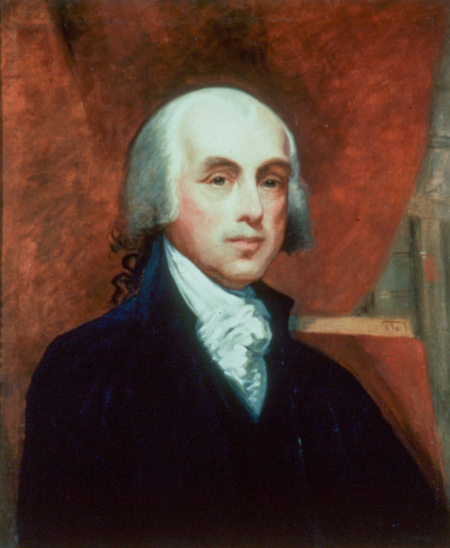Washington, DC James Madison writes his instructions for negotiations with France, Thomas Jefferson asks Robert Patterson to tutor Meriwether Lewis, and the Board of Agriculture’s appeal to the American citizens is published.
James Madison (1751-1836)
by Catherine Drinker (1841-1922)
of a portrait by Gilbert Stuart
Independence National Historical Park.
Madison was a Virginian and classics and theological scholar. He noted the weakness of federated systems and worked successfully for the Constitutional Convention. He was appointed Secretary of State by Jefferson and served the country well to keep navigation on the Mississippi open to American interests. He was President during the War of 1812.
Madison’s Instructions
Department of State March 2d 1803
Gentlemen
The object in view is to procure by just and satisfactory arrangements, a Cession to the United States, of New Orleans, and of West and East Florida, or as much thereof as the actual proprietor can be prevailed on to part with.
. . . . .
The time chosen for this experiment is pointed out also by other important considerations: The instability of the peace of Europe, the attitude taken by Great Britain, the languishing state of the French finances, and the absolute necessity of either abandoning the West India Islands or of sending thither large armaments at great expence all contribute at the present crisis to prepare in the French Government a disposition to listen to an arrangement which will at once dry up one source of foreign controversy, and furnish some aid in struggling with internal embarrassments.
. . . . .
The payment to be made immediately on the exchange of ratifications is left blank; because it cannot be foreseen either what the gross sum or the assumed debts will be; or how far a reduction of the gross sum may be influenced by the anticipated payments provided for by the act of Congress herewith communicated and by the authorization of the President and Secretary of the Treasury endorsed thereon.
With great Respect and Consideration, I have the Honor to be, Gentlemen, Your Obedt huble. servant,
James Madison[1]James Madison to Robert R. Livingston and James Monroe, Founders Online, National Archives, founders.archives.gov/documents/Madison/02-04-02-0448 accessed 17 May 2022. [Original source: The Papers of … Continue reading
Recruiting Robert Patterson
Washington Mar. 2. 1803.
Dear Sir
. . . we are at length likely to get the Missouri explored, & whatever river heading with that, leads into the Western ocean. Congress by a secret act has authorised me to do it. I propose to send immediately a party of about ten men with Capt Lewis, my secretary, at their head.
. . . . .
he has been for some time qualifying himself for taking observations of longitude & latitude to fix the geographical points of the line he will pass over. but little means are possessed here of doing that; and it is the particular part in which you could give him valuable instruction, & he will recieve it thankfully & employ it usefully.
. . . . .
he will be in Philadelphia 2. or 3. weeks hence to procure instruments & will take the liberty to call on you; and I shall be particularly obliged to you for any advice or instruction you can give him.
I think it adviseable that nothing should be said of this till he shall have got beyond the reach of any obstacles which might be prepared for him by those who would not like the enterprise. Accept assurances of my sincere esteem & great respect.
Th: Jefferson[2]Thomas Jefferson to Robert Patterson, Founders Online, National Archives, founders.archives.gov/documents/Jefferson/01-39-02-0526 accessed 11 May 2022. [Original source: The Papers of Thomas … Continue reading
Briggs Addresses Board
ADDRESS from the AMERICAN BOARD OF AGRICULTURE.
To the citizens of the United States.
Of the vast variety of objects, to which the energies of the human mind have been directed in the extensive range of science, there is none which merits so much, and which receives so little encouragement from the exertions of the learned as the subject of agriculture. [The National Board of Agriculture’s] progress and its utility will depend on the ardor with which the objects it points to are pursued . . . supported by the aid and co-operation of intelligent practical agriculturists.
. . . . .
Whatever will throw light on the history of the agriculture and manufactures of this country; whatever will have a tendency to ameliorate the soil, increase the productions and lessen labor, will be acceptable to the society.
. . . . .
Published by order of the American Board of Agriculture.
ISAAC BRIGGS,
Secretary
Washington,
22 Feb. 1803.[3]The National Intelligencer and Washington Advertiser, (Washington City [D.C.]), 02 March 1803. Chronicling America: Historic American Newspapers. Lib. of Congress. pages 1 and 2, … Continue reading
Notes
| ↑1 | James Madison to Robert R. Livingston and James Monroe, Founders Online, National Archives, founders.archives.gov/documents/Madison/02-04-02-0448 accessed 17 May 2022. [Original source: The Papers of James Madison, Secretary of State Series, vol. 4, 8 October 1802–15 May 1803, ed. Mary A. Hackett, J. C. A. Stagg, Jeanne Kerr Cross, Susan Holbrook Perdue, and Ellen J. Barber. Charlottesville: University Press of Virginia, 1998, pp. 364–379.] |
|---|---|
| ↑2 | Thomas Jefferson to Robert Patterson, Founders Online, National Archives, founders.archives.gov/documents/Jefferson/01-39-02-0526 accessed 11 May 2022. [Original source: The Papers of Thomas Jefferson, vol. 39, 13 November 1802–3 March 1803, ed. Barbara B. Oberg. Princeton: Princeton University Press, 2012, p. 618.] |
| ↑3 | The National Intelligencer and Washington Advertiser, (Washington City [D.C.]), 02 March 1803. Chronicling America: Historic American Newspapers. Lib. of Congress. pages 1 and 2, chroniclingamerica.loc.gov/lccn/sn83045242/1803-03-02/ed-1/seq-1/ |

